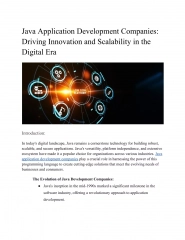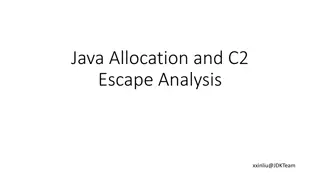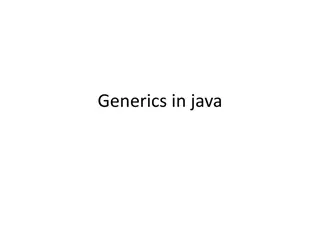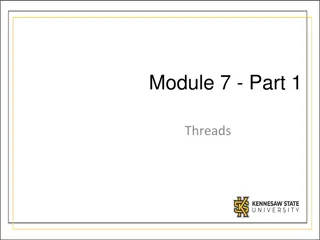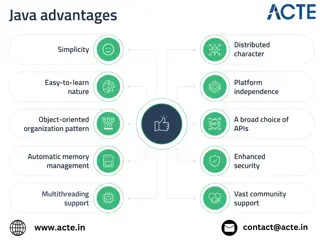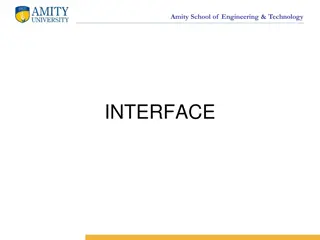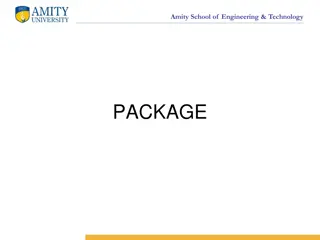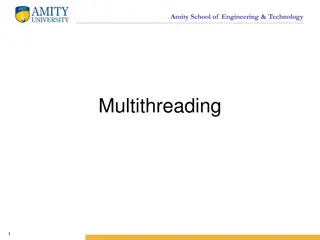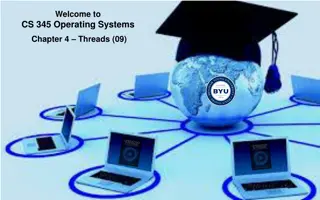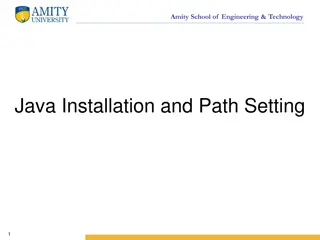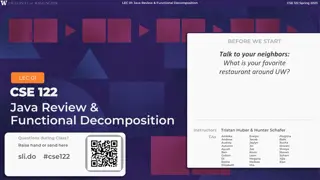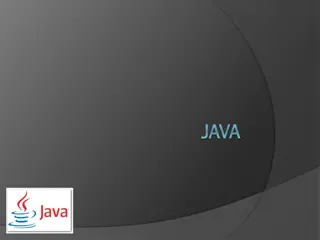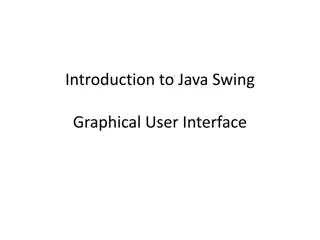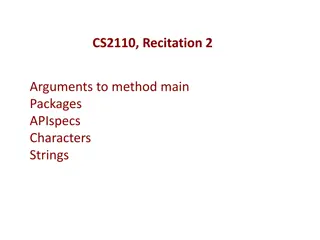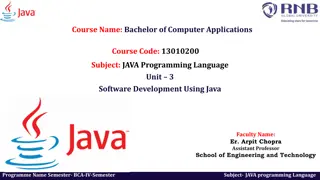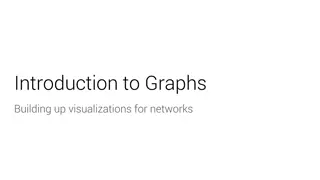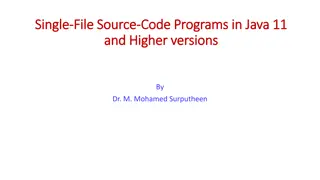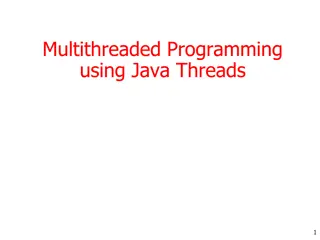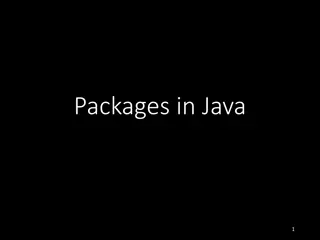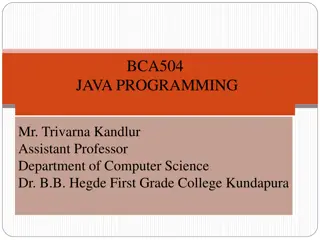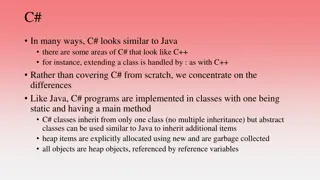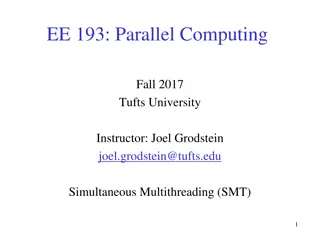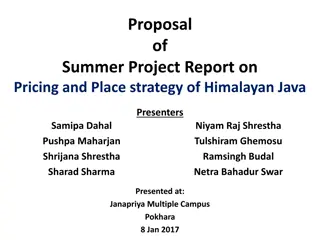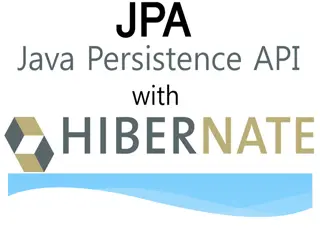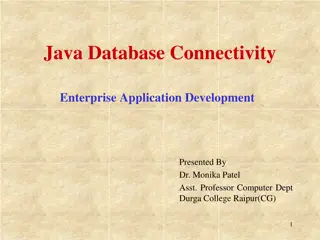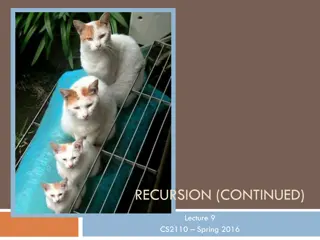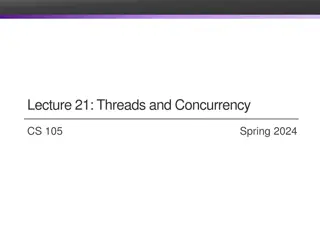Java application development company (1)
In today's digital landscape, Java remains a cornerstone technology for building robust, scalable, and secure applications. Java's versatility, platform independence, and extensive ecosystem have made it a popular choice for organizations across various industries. Java application development compa
2 views • 4 slides
Variables, Assignment,and Data Types
Explore key Java programming concepts such as variables, assignment, data types, Java keywords, printing strings, pseudocode, escape sequences, and more. These fundamental topics are essential for building a strong foundation in Java programming. Dive into code examples and explanations to enhance y
7 views • 13 slides
Java Allocation and C2
Java object allocation and escape analysis play crucial roles in memory management and performance optimization within the Java Virtual Machine (JVM). This comprehensive overview covers topics such as object vs. scalar allocation, object allocation mechanisms, hotspot escape analysis, ideal and conn
2 views • 22 slides
Threads is a new app by Instagram that lets people share photos, videos, and messages with just their close friends
Threads is a new app by Instagram that lets people share photos, videos, and messages with just their close friends. This makes it different from the regular Instagram app, which is more public-facing. Because Threads is all about close connections, it can be a great tool for marketers to connect wi
6 views • 7 slides
Understanding Generics in Java
Generics in Java allow for parameterized types, enabling the use of different data types in classes, interfaces, and methods. By creating generic entities, such as classes that work with various data types, Java programmers can write more flexible and reusable code. This concept is demonstrated thro
0 views • 16 slides
Understanding Threads in Computing
Exploring the concepts of parallel, distributed, and concurrent computing processes and how threads, cores, and CPUs work together. Delve into the terminology, implementation in Java and C#, synchronization, and the importance of leveraging multiple cores for enhanced performance.
0 views • 24 slides
Understanding Threads, Linked Lists, and Programming Models in Concurrent Programs
Delve into the concepts of threads, linked lists, and programming models in concurrent programs. Explore the use of threads for handling multiple requests, the struct types in programming, and the various access methods for lists. Learn about the benefits of threads and how they enable parallel proc
0 views • 44 slides
Understanding Java: The Backbone of Cross-Platform Development
Java stands as a cornerstone in the realm of programming languages, revered for its versatility and robustness. Enrolling in a Java Course in Pune significantly enhances one\u2019s ability to leverage Java\u2019s capabilities effectively. Understandi
1 views • 1 slides
Understanding Java Interfaces in Amity School of Engineering & Technology
Java interfaces are a key concept in object-oriented programming that allows for achieving multiple inheritance. The article discusses how Java interfaces work, their role in defining class behavior, and the differences between interfaces and classes. It also explains the syntax for declaring interf
2 views • 48 slides
Understanding Java Packages and Their Importance in Programming
An exploration of Java packages, their role in structuring code, organizing classes, and enhancing code reusability. Learn about built-in and user-defined packages, the Java API's package organization, and the different types of packages available in Java programming. Discover how packages help in c
2 views • 18 slides
Understanding Multithreading and Multiprocessing in Amity School of Engineering & Technology
Explore the concepts of multithreading and multiprocessing at Amity School of Engineering & Technology. Learn about the types of multiprocessing, threads, thread life cycle, advantages of multithreading, and the importance of user and daemon threads in Java programming. Dive into the world of utiliz
0 views • 96 slides
Understanding Threads and Task Scheduling in Operating Systems
Threads and task scheduling play a crucial role in modern operating systems. This chapter delves into the concept of threads, including standard integer typedefs and the importance of multitasking. It explores the implementation of a five-state task scheduler capable of executing multiple tasks effi
0 views • 25 slides
Amity School of Engineering & Technology Java Installation Guide
In this detailed guide provided by Amity School of Engineering & Technology, learn how to install and set up Java on your system effectively. The step-by-step instructions cover downloading the Java installer, configuring the installation wizard, setting environmental variables, and more to ensure a
1 views • 19 slides
Java Review & Functional Decomposition in CSE 122 Spring 2023
Lecture 01 in CSE 122 covers Java review, functional decomposition, and code quality. Announcements include a Java review session, programming assignments, and reminders on Java syntax. The session encourages active participation through in-class activities using Slido polls. Students are also urged
0 views • 24 slides
Understanding Interactive Programs and Input/Output in Java
Interactive programs in Java allow users to input data through the console, which can be captured and used in the program. This involves using the Scanner class to read user input, and understanding common Scanner methods to process different types of input. Importing Java class libraries is essenti
2 views • 15 slides
Learning Swing with Java Foundation Classes (JFC) and Swing
Java Foundation Classes (JFC) and Swing provide a powerful set of tools for building graphical user interfaces in Java applications. This includes Swing GUI components, pluggable look-and-feel support, accessibility APIs, Java 2D graphics, and internationalization capabilities. By learning Swing wit
1 views • 11 slides
Understanding Java Swing for Building Graphical User Interfaces
Java Swing is a powerful framework for creating graphical user interface applications in Java. It provides a wide array of visual components such as JFrame, JComponent, and JPanel, enabling developers to build interactive and visually appealing applications easily. With Swing, developers can design
1 views • 25 slides
Java Application Development Basics
Learn how to create a Java application with a main method using Eclipse. Understand the concept of method parameters and how to provide arguments when running the application through Eclipse's Run Configurations feature. Explore the structure of packages in Java and the Java API.
0 views • 26 slides
Understanding Java Programming: BCA IV Semester Course Overview
This Bachelor of Computer Applications (BCA) course focuses on Java programming language fundamentals, object-oriented concepts, software development principles, and practical application skills. Students will learn to define Java program features, implement object-oriented features, work with array
0 views • 31 slides
Exploring Graphs: Visualizations and Representations in Java
Delve into the world of graphs with a focus on visualizations for networks and building up graph representations in Java. Explore different graph representations, adjacency lists, and key-value mappings, along with insights on storing and tracking data efficiently using Java data structures. Dive in
0 views • 12 slides
Understanding Single-File Source Code Programs in Java 11
Explore the concept of single-file source code programs in Java 11, where the entire program is contained within a single .java file without external dependencies. Learn how to compile and run these programs both before and after Java 11, and discover the new feature of executing Java programs direc
0 views • 11 slides
Understanding Scanner Class in Java: Reading User Input and Processing Files
The Scanner class in Java's java.util package allows reading input from the keyboard or files. It looks for tokens in the input, reads different types of values, and has methods like nextInt() and nextLine(). You can also read from files by creating a File object. Learn how to use Scanner to interac
0 views • 21 slides
Guide to Multithreaded Programming using Java Threads
Explore the world of multithreaded programming with Java threads, covering topics such as defining threads, thread applications, priorities, accessing shared resources, synchronization, and advanced concurrency models. Delve into the differences between multithreading and multiprocessing, and learn
0 views • 46 slides
Understanding Packages in Java: A Comprehensive Overview
Packages in Java play a crucial role in organizing and structuring code for efficient reuse and maintenance. They allow you to group related classes together, provide encapsulation, and facilitate code organization. This article dives into the basics of Java packages, advantages they offer, differen
0 views • 19 slides
Introduction to Java Programming: Basics and Applications
Java, developed by James Gosling, is a versatile object-oriented programming language used for mobile, desktop, web applications, servers, games, and more. It is renowned for its platform independence, popularity, ease of use, security, and strong community support. This subject delves into Java fun
0 views • 15 slides
Java Overview and Basics: Understanding the Fundamentals of Java Programming
Java is a versatile programming language known for its simplicity, security, portability, and high performance. Its history dates back to 1990 when the concept was first suggested, leading to the creation of Java in 1995 by James Gosling. Over the years, Java has evolved with various versions introd
0 views • 65 slides
Understanding Threads and Concurrency in Systems Programming
Delve into the world of threads, exploring their concepts, schedulers, memory access speeds, and lightweight vs. heavyweight distinctions. Discover how NUMA machines enhance parallelism, the role of threads in Linux kernel management, and examples like word count applications. Gain insights into man
0 views • 55 slides
Overview of Java Programming Language
Java is a versatile and powerful programming language created by James Gosling and others at Sun Microsystems in the 1990s. It aims for portability, reliability, safety, simplicity, and efficiency. With a strong focus on object-oriented programming, Java has evolved over the years with a rich histor
0 views • 33 slides
Why Threads Are a Bad Idea for Most Purposes - John Ousterhout's Perspective
John Ousterhout, from Sun Microsystems Laboratories, argues that threads are difficult to program and manage due to challenges like synchronization, deadlock, and breaking abstraction. He suggests using events over threads for most purposes. Threads should only be used when true CPU concurrency is n
0 views • 15 slides
Mastering Generics in Effective Java: A Practical Guide for Java Programmers
Explore the world of generics in Java through Joshua Bloch's guidance in "Effective Java". Learn the importance of avoiding raw types, leveraging parameterized types for type safety, handling mixing of generic and raw types, and implementing wildcards for flexible and typesafe coding. Enhance your J
0 views • 30 slides
Differences Between C# and Java: A Comparative Overview
C# and Java share similarities in syntax and features, but there are key distinctions that set them apart. From class inheritance to memory management, this comparison highlights the unique aspects of C# programming. Explore how C# diverges from Java in terms of multiple inheritance, explicit heap a
0 views • 16 slides
Introduction to Parallel Computing Concepts
Exploring the concepts of threads, pipelining, and dependence in parallel computing. Discussions on why multiple threads are beneficial, pipelined instructions, and the challenges of dependencies in executing instructions sequentially. Delve into Simultaneous Multithreading (SMT) and its advantages
0 views • 9 slides
Study on Pricing and Place Strategy of Himalayan Java Coffee: A Detailed Analysis
This report delves into the pricing and place strategies of Himalayan Java coffee, focusing on factors influencing coffee pricing and selection of outlet locations. The study aims to identify the target market, understand competitive dynamics, and analyze factors impacting coffee sales at Himalayan
0 views • 10 slides
Understanding Java Persistence API (JPA) for Data Management in Java Applications
Java Persistence API (JPA) is a specification that provides a framework for managing relational data in Java applications. It simplifies ORM solutions, offers vendor independence, and supports test-driven development with annotation-driven mapping.
0 views • 31 slides
Introduction to Java Database Connectivity (JDBC) in Enterprise Application Development
JDBC, or Java Database Connectivity, is a vital technology in enterprise application development that provides a standardized library for Java programs to connect to databases via SQL commands. It abstracts vendor-specific details, making connectivity to multiple databases seamless. JDBC API standar
0 views • 13 slides
Understanding Recursion in Java: CS2110 Lecture Overview
This content delves into the concept of recursion in the context of Java programming as discussed in the CS2110 Spring 2016 lecture series. It covers the basics of recursion, including base cases and how Java stack frames operate. The material also includes solutions to exception-handling problems a
0 views • 21 slides
Understanding and Avoiding Deadlocks and Livelocks in Concurrent Programming
Deadlocks and livelocks are common issues in multi-threaded programming. Deadlocks occur when two or more threads are waiting for each other to release a resource, leading to a standstill. Livelocks, on the other hand, involve threads that are actively trying to resolve a resource conflict but end u
0 views • 43 slides
Exception Handling in Java: Understanding Errors and Exceptions
Exception handling in Java is crucial for dealing with errors and exceptions that can occur during program execution. Errors and exceptions are conditions that disrupt the normal flow of a program, and understanding their differences is key to effective error management. This chapter covers the conc
0 views • 32 slides
Understanding Threads and Concurrency in Programming
Exploring the concepts of threads and concurrency in programming, this content delves into the benefits of concurrent programs, different views of processes, and the distinction between threads and processes. It highlights the significance of managing I/O devices, utilizing multiprocessors for enhan
0 views • 31 slides
Understanding Processes, Threads, and Thread Management
Explore the concepts of processes and threads, distinguish between them, and delve into the implementation of threads at kernel-supported and user-level. Discover the differences in address spaces and thread management tactics for efficient CPU utilization.
0 views • 14 slides
